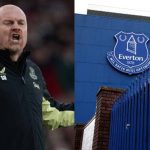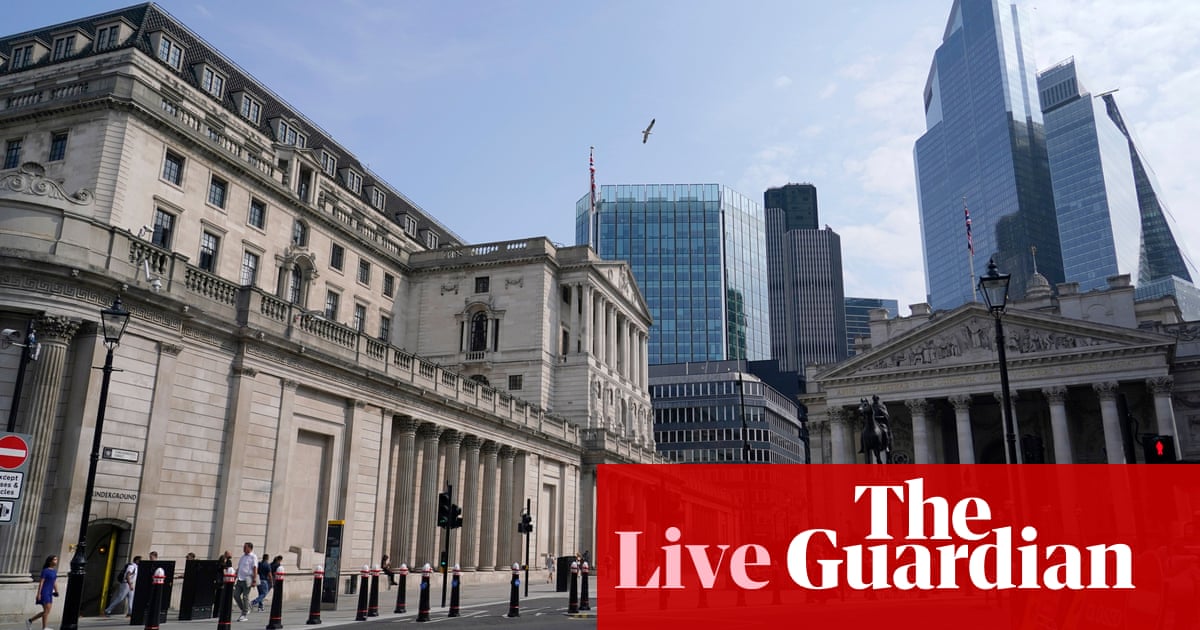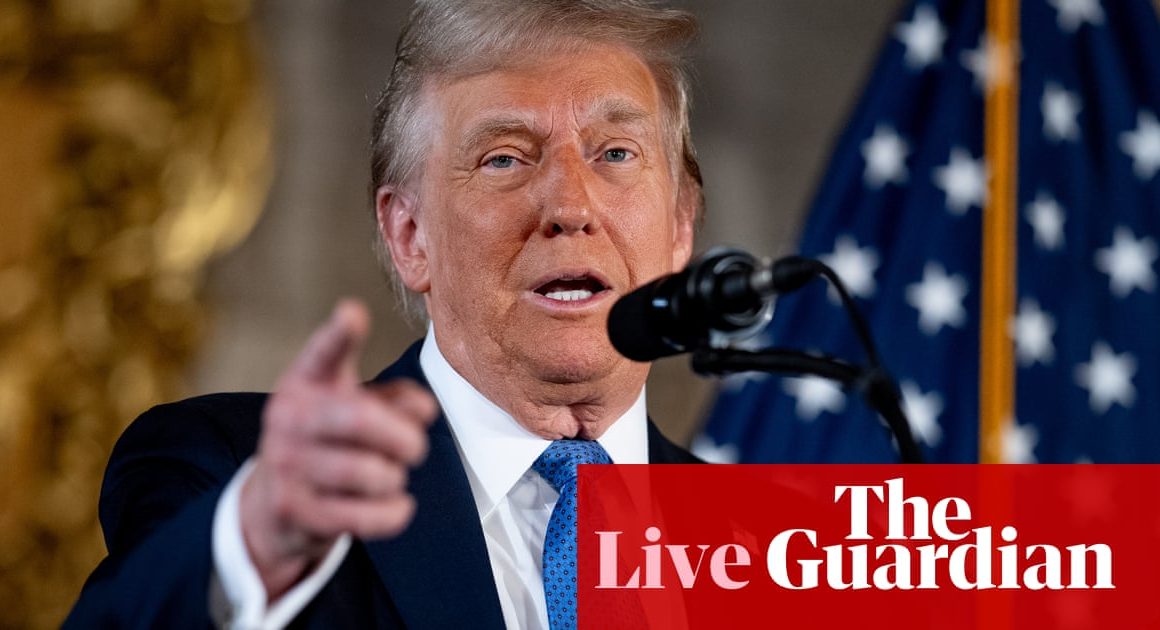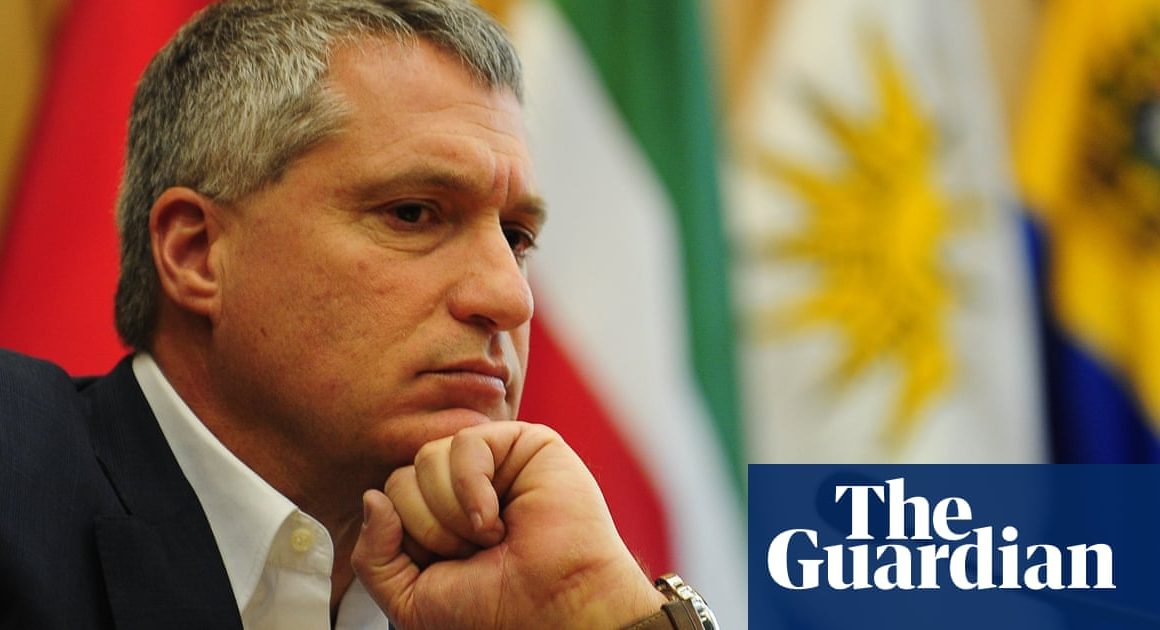Bank of England interest rate decision
Newsflash: The Bank of England has cut UK interest rates for a second time this year.
As City experts had predicted (see opening post), the Bank’s monetary policy committee have voted to lower Bank Rate by a quarter of one percentage points, down from 5% to 4.75%.
It’s the second cut this year, following August’s reduction, and comes after inflation fell below its 2% target in September.
The Bank will have made the decision having assessed last week’s UK government budget and Donald Trump’s election as US president.
Key events
Q: Is it reasonable to conclude that the outlook for inflation would be broadly consistent with your 2% target if the Bank made four more quarter-point cuts over the next year, as the markets expect?
Bailey emphasises that the Bank will take a “gradual” approach to easing policy – but won’t say if ‘gradual’ means one cut every quarter.
Q: The dollar strengthened strongly yesterday as the US election results came in, and bond yields rose – if that continues, how will that effect the UK economy?
Andrew Bailey points out that the UK’s interest rate curve – which shows where the markets expect borrowing costs to be – didn’t rise yesterday in line with the US.
However on Friday, when weak US jobs data hit the bond market, they did move together.
He adds:
It’s important that we see what the policies the new Trump administration decides to announce are. We’re not at that point yet.
The Bank of England’s regional agents have heard that UK firms have found it harder to pass on costs through higher prices in the last year, Andrew Bailey tells today’s press conference.
Q: Companies in the services sector will be hardest hit by the rise in employers’ NICs contributions. This morning, the boss of Sainsbury’s said it would be inflationary.
Are you being slightly optimistic with your inflation forecasts, such as for inflation?
Andrew Bailey says the NICs change “clearly raises the cost of employment”, and that he laid out the various channnels – wages, profits, prices, and employment levels – where the impact could flow through (as covered in this earlier post).
Bank deputy governor Clare Lombardelli says there’s “a lot of uncertainty” over how firms will respond to the NICs measures.
The Bank has assumed a range of responses, and has modelled changes to both wages and prices, Lombardelli explains, adding:
We also think it will change over time, and affect different firms in different sectors differently.
BoE: must avoid fragmentation of the world economy.
Q: Donald Trump says ‘tariff’ is the most beautiful word in the dictionary – do you agree? And what do they mean for a country’s growth and inflation?
Governor Andrew Bailey says there are “many words in a dictionary”, and he doesn’t have a favourite.
But on tariffs, he says:
We do have to watch very carefully the fragmentation of the world economy.
It’s important, so we have to consider those consequences for both monetary policy and financial stability objectives.
Frankly there are a lot of risks attached to the fragmentation of the world economy.
Q: How much of the recent increase in expectations for UK interest rates was due to domestic factors, versus international ones?
Andrew Bailey says the latest data on changes in the the interest rate curve shows quite a large international element.
Q: At what level of interest rates will interest rates no longer be restrictive?
There’s no danger of the Bank giving a straight answer to this one.
Andrew Bailey insists that the Bank does not have a level of neutral interest rates in mind.
But he does give some guidance – he doesn’t expect rates to fall to the very low levels we saw a few years ago, unless there is a major shock.
Q: How exposed is the UK economy to a potential global trade war? As we export more services than goods, are we more immune?
Andrew Bailey says the UK is an open economy, adding that he won’t make any presumptions or speculate about what may happen.
We will have to watch this very closely.
Bailey adds that there will be a “very open dialogue” between the UK and US governments.
Bank of England will work with Trump administration
Q: How does the Bank of England assess the risk of trade protectionism from the US election result?
Governor Andrew Bailey says the Bank always responds to announced policies.
He explains that the Bank works with all US administrations – mainly on financial stability, rather than monetary policy issues, adding:
We look forward to working with the new administration. We worked with the previous Trump administration, we work with the current administration. That’s our job, that’s what we do, without any presumptions.
Q: Your forecasts show inflation isn’t returning to target until the middle of 2027, compared with the middle of 2026 which you thought before the budget, so has the budget made your job harder?
Bailey says the ‘good news’ from the Bank today is that inflation has been falling faster than expected.
But there is “greater uncertainty out there”.
Firstly, greater global uncertainty “without doubt”.
Also, the Bank wants to see the impact that budget measures have on the economy.
Q: Has the market reaction to the budget been orderly?
[reminder, UK borrowing costs jumped after Rachel Reeves presented the budget on Wednesday].
Andrew Bailey says the market had been positioned for lower interest rates at the start of last week, and some of those positions closed as the market moved after the budget.
Then on Friday afternoon, the US election was the dominating event on the market.
Bailey says the Bank’s staff heard that investors were reluctant to take positions until they knew the result of the US election.
Q: Should households expect mortgage rates to be higher than they would have been otherwise, due to the budget?
Andrew Bailey points out that mortgage rates have fallen since the Bank’s last monetary policy report in August.
He doesn’t indicate that the budget will drive up mortgage rates, saying:
I don’t think that it’s sensible to conclude that the path of interest rates will be particularly different.
Larry Elliott applauded off the pitch
Onto questions, and the first goes to my esteemed colleague Larry Elliott.
Q: Is the message from this report that interest rates will stay higher for longer because of the budget?
Andrew Bailey begins with a tribute to Larry, who is stepping down from his role of Guardian economics editor this month.
The governor says:
“We all want to join together and thank you for everything you’ve done for British economics journalism, and wish you all the best for the future. It’s been a pleasure working with you.
Larry then gets a round of applause – a rare event at these press conferences.
As Bailey points out:
You are of course the first person ever to get applause in this press conference, because we will never.
Larry fans shouldn’t get too despondent (although I am) as he’ll still be writing his fortnightly column.
Onto the question, and Bailey points out that the Bank did cut rates today having seen the budget.
There is some upward effect on inflation, but the path of inflation – we think – returns to the target by the horizon.
Bailey: How employers might respond to NICs increase
There are different ways the increase in employers’ national insurance contributions announced in the budget could play out in the economy, BoE governor Andrew Bailey says.
It increases the cost of employment, he explains, and there are at least four potential margins of adjustments
-
Firms could pass it on through higher prices paid by consumers
-
They could absorb it through lower profit margins or higher productivity
-
firms could increase wages by less than they would otherwise
-
They could reduce employment.
Bailey won’t opine on the policy itself, but the Bank must respond to its consequences on inflation, he says.












